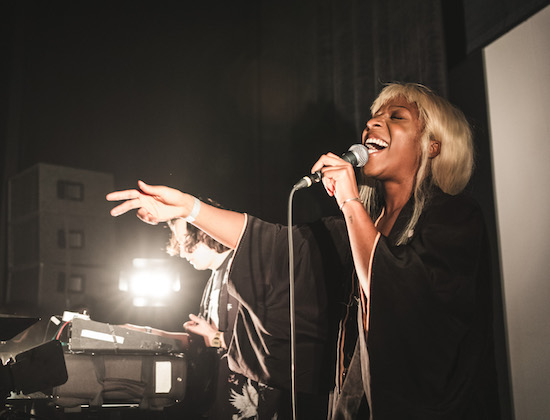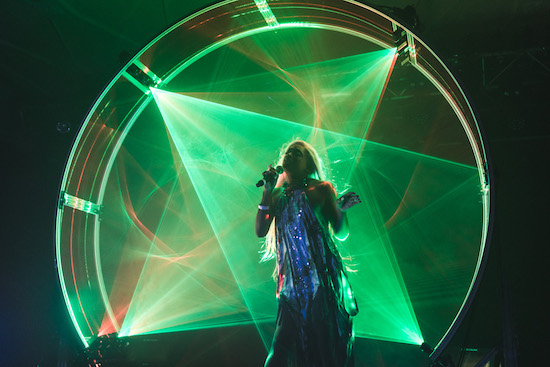It felt weirdly fitting that I found myself in Belgium on the weekend of the People’s March. Instead of demonstrating in London, I was in city at the centre of the EU, enjoying perhaps the last few weeks of passport privilege, while at a festival that showed the beauty and necessity of spaces for cultural exchange outside the mainstream.
Brexit, inevitably, is omnipresent at the back of my mind, and yet there’s something escapist about being here all the same – not least because Ghent’s cobbled streets are like something out of a fairytale and, in the case of Out The Frame festival, the reason that I’m here, the event is taking place at Vooruit. The formidable, majestic venue with multi-storeys, high ceilings and marble staircases is playing host to a night of glorious left-field iterations of rap, pop and electronic music, and there’s a surreal grandeur to the setting that feels fitting for the vast array of sounds that lie within.
Prison Religion are a great insight into the thoughtful curation that has taken place for the evening: the Virginia rap duo channel noise and hardcore as much as they do the gleaming, metallic, Pi’erre Bourne end of hip hop. The milling crowd is standing metres away from the stage, everyone too scared to be at the front – the result, of course, being that False Prpht, one half of the pair, enters the crowd, dancing and flitting around with a languid fury – “Y’all can move closer, you know… I’m not gonna hurt you.” People slowly take the hint, shifting closer with either trepidation or incredibly enthused ska dancing, both of which kind of make sense: the set is at-once terrifying and thrilling. Overall, there’s something about the way False Prpht screams with a tremulous, primal desperation that makes it impossible to look away from.
The pair stand in stark contrast with Flemish rapper Glints, who’s on upstairs. The local artist’s sound blends a curious Jamie T-style accent (it transpires his parents are British) with poppy synths that veer on Eurotrash – the crowd loves it, not least when he’s joined by another local favourite, DVTCH NORRIS, who gives a rousing performance later on. The crowd are also exuberant for London MC Barney Artist, whose set exudes a kind of bright and energised, old school warmth with his boom-bap-esque sounds.
Meanwhile, there’s a giant queue forming outside of the Theaterzaal room for Belgian-Caribbean Charlotte Adigéry. It had been impossible to get into the same venue earlier for Quelle Chris’ one-off collaboration with local jazz drummer Lander Gyselinck so organiser have decided to open up another part of the same room. It’s a good call because she attracts the biggest crowd of the night and the show ends up being like a surreal out-of-body experience. Adigéry and her musical partner Bolis Pupal are both on a stage which, in itself, is on another, slightly larger stage, where some of the crowd are allowed to stand and dance – the rest of us are directed to the red velvet seats, surveying the scene like it’s a play. Certainly it adds a degree of fun theatricality (albeit it’s frustrating feeling one step removed), and Adigéry is mesmerising regardless, voguing and grinning as she sings the intoxicating refrain from ‘Paténipat’ over the pulsing beat: surely she is the future of pop?

That party vibe is markedly different from the almost devotional atmosphere during Lafawndah’s set, though it’s equally captivating. One day previous to the show, the Egyptian-Iranian artist released her astonishing debut album, Ancestor Boy, and tonight she is otherworldly. Barefoot in black velvet, and bathed in delicate, intricate percussion from the incredible Valentina Magaletti, there’s a soft power to the performance as she pours out songs from the album – skittering single ‘Daddy’ and gentle cover, ‘Vous Et Nous’. There’s also an astonishing, odd moment of unknown prescience when, for the first time ever, she decides to perform a rendition of Scott Walker’s ‘Bouncer See Bouncer’ – just days later, that fascinating pioneer artist would pass away. Looking back, it makes the whole set feel even more spellbinding and beautiful.
Closing the festival (before the after-party gets started, at least) is Lotic. The Endless Power A/V set is like a fantasia – the Berlin-based producer struts and carves bodily shapes like a hologram against the rainbow circle of lights, while breathily delivering lines from last year’s glitchy, queer wonder, Power. They apologise for being pitchy at times (Lotic turned 30 on the same weekend and, accordingly, was celebrating), but any flaws in delivery sincerely feel hard to notice or care about when it’s such a hypnotic show, both sonically and aesthetically. Blonde hair fanned out like some kind of plasma globe Medusa, and coy smile on face, when Lotic’s got gloriously potent nerve.
It is impossible to know what will happen in the coming days, let alone years with the UK and Europe – but Out The Frame shows the power of spaces where art from across the world can coalesce: where we can build fairytale and fantasia out of strange, challenging sounds. Maybe the UK is stupidly going to not be a part of the EU anymore, but festivals like this are to be commended for serving as a reminder to build spaces of escape and resistance: in truth, regardless of what happens with Brexit, that’s hardly going to be the end of problems for migrants and immigrants and POC. And so we look to the rage of Prison Religion, the calming solemnity of Lafawndah, but also the radical celebration of Lotic and Charlotte Adigéry in in Ghent, and keep imagining better futures. To paraphrase Lotic, the power of that is endless.


